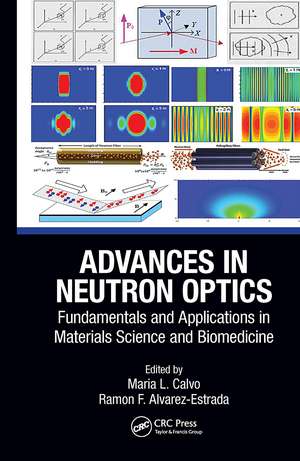Advances in Neutron Optics: Fundamentals and Applications in Materials Science and Biomedicine: Multidisciplinary and Applied Optics
Editat de Maria L. Calvo, Ramon F. Alvarez-Estradaen Limba Engleză Paperback – 2 oct 2023
Features:
- Discusses diffraction and interference of slow neutrons, including computational approaches
- Reviews neutron imaging (NI) and neutron spin optics (NSO)
- Treats two major sources of slow neutron beams: (1) fission reactions at nuclear reactors and (2) collisions in particle accelerators (small ones, spallation sources) of charged particle beams with targets of heavy atoms
- Selects subjects on fundamental quantum aspects of slow neutrons and on confined propagation and waveguiding thereof
- Updates slow neutron beams and BNCT
| Toate formatele și edițiile | Preț | Express |
|---|---|---|
| Paperback (1) | 312.15 lei 6-8 săpt. | |
| CRC Press – 2 oct 2023 | 312.15 lei 6-8 săpt. | |
| Hardback (1) | 767.07 lei 6-8 săpt. | |
| CRC Press – 28 noi 2019 | 767.07 lei 6-8 săpt. |
Preț: 312.15 lei
Preț vechi: 386.65 lei
-19% Nou
Puncte Express: 468
Preț estimativ în valută:
59.73€ • 62.37$ • 49.32£
59.73€ • 62.37$ • 49.32£
Carte tipărită la comandă
Livrare economică 15-29 aprilie
Preluare comenzi: 021 569.72.76
Specificații
ISBN-13: 9781032653563
ISBN-10: 1032653566
Pagini: 308
Dimensiuni: 156 x 234 mm
Greutate: 0.44 kg
Ediția:1
Editura: CRC Press
Colecția CRC Press
Seria Multidisciplinary and Applied Optics
ISBN-10: 1032653566
Pagini: 308
Dimensiuni: 156 x 234 mm
Greutate: 0.44 kg
Ediția:1
Editura: CRC Press
Colecția CRC Press
Seria Multidisciplinary and Applied Optics
Public țintă
Academic and Professional Practice & DevelopmentCuprins
SECTION I: An Introductory Approach to the Foundations of Neurton Optics. 1. Neutron Optics- Fundamentals. 2. Neutron Matter-Wave Diffraction: A Computational Perspective. 3. Neutron Confinement and Waveguiding. SECTION II Neutron Optics-Based Technologies and Applications. 4. Neutron Imaging. 5. Neutron Spin Optics: Concepts, Verification and Prospects. 6. Applications of Neutron Optics to Biomedicine: BNCT.
Notă biografică
Maria L. Calvo, Ph. D. is Emeritus professor at the Department of Optics, Faculty of Physical Sciences, Complutense University of Madrid (UCM) (Madrid, Spain). She initiated research at the CNRS (Paris, France) in the Glass Laboratory. She also founded and leads the Interdisciplinary Group for Optical Computing (GICO-UCM) created in 2001 from the former Interdisciplinary Group for Biooptics initiated earlier in 1993. Her theoretical research interests include classical formalism for light scattering, optical waveguide theory and neutron waveguides, photonic devices, and applications to particular media such as holographic gratings. In the experimental physics she has relevant contributions in the design, synthesis and characterization of holographic photomaterials. She has been a visiting professor in other institutions as the University of California at Berkeley and the University of Saint Louis-Missouri. On all the mentioned subjects she has published as author or co-author more than 200 scientific articles. Calvo has taught general and specialized courses in optics for both undergraduate and master’s degree candidates in physical science at UCM. She is involved in education and professional issues. She has authored, coordinated and edited various textbooks in Spanish and in English. She has been President of the International Commission for Optics (ICO) during the term 2008-2011.
Ramon F. Alvarez-Estrada, Ph.D. is Emeritus professor of physics at the Department of Theoretical Physics, Faculty of Physical Sciences, Complutense University of Madrid (UCM), Madrid, Spain, where he has taught undergraduate and graduate courses (since 1975). He has been group leader on research projects (1986-2012), sponsored by successive Ministries of Science in Spain. He has been visiting scientist in Faculté des Sciences d’ Orsay, Université de Paris, and visiting professor at Theory Division, CERN, Geneva, Switzerland and at Theoretical Physics Group and Nuclear Science Division, Lawrence Berkeley Laboratory, University of California at Berkeley, California. He has published, as author and coauthor, more than 120 research papers in international scientific Journals on: elementary particle physics, quantum field theory, quantum physics and scattering, classical and quantum optics, non-equilibrium classical and quantum statistical mechanics, statistical mechanics of macromolecular chains and, since 1984, neutron optics. He has coauthored one research book in English, co-authored three textbooks in Spanish, and authored and co-authored contributed chapters to books, in particular, on neutron optics.
Ramon F. Alvarez-Estrada, Ph.D. is Emeritus professor of physics at the Department of Theoretical Physics, Faculty of Physical Sciences, Complutense University of Madrid (UCM), Madrid, Spain, where he has taught undergraduate and graduate courses (since 1975). He has been group leader on research projects (1986-2012), sponsored by successive Ministries of Science in Spain. He has been visiting scientist in Faculté des Sciences d’ Orsay, Université de Paris, and visiting professor at Theory Division, CERN, Geneva, Switzerland and at Theoretical Physics Group and Nuclear Science Division, Lawrence Berkeley Laboratory, University of California at Berkeley, California. He has published, as author and coauthor, more than 120 research papers in international scientific Journals on: elementary particle physics, quantum field theory, quantum physics and scattering, classical and quantum optics, non-equilibrium classical and quantum statistical mechanics, statistical mechanics of macromolecular chains and, since 1984, neutron optics. He has coauthored one research book in English, co-authored three textbooks in Spanish, and authored and co-authored contributed chapters to books, in particular, on neutron optics.
Descriere
Neutron optics involves studying the interactions of matter with a beam of free slow neutrons. This book discusses two major sources for the production of beams of free slow neutrons: (1) fission reactions at nuclear reactors and (2) collisions in particle accelerators (small ones, spallation sources) of proton beams with targets of heavy atoms.






